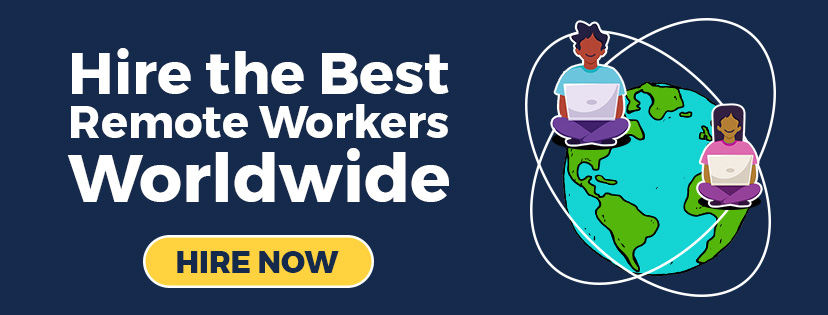Working from home is the new mainstream. With roles and positions in virtual teams, are also increasing the possible mistakes when hiring remote.
Who doesn’t work remotely nowadays? Especially for employers, virtual teams have always been a winning option far before COVID-19.
One of the biggest benefits is saving money. That’s right. For a company, virtual teams can save quite a decent amount of money. As a remote business, office supplies, technology, electricity, furniture, and other items or any service a company provides to employees it’s a massive cut in budget.
Plus, you can hire remote professionals without the need to commute to a specific office and be more flexible on the company’s working hours. Several studies have shown that remote employees are more productive when working from the comfort of their homes.
A new whole world of skilled professionals is accessible to any company, disrupting geographical boundaries. It sounds all great, but any Ying comes with a Yang: How to make sure to get the right person? A bad hire doesn’t only waste time and resources, but also negatively impacts your team members.
During the remote hiring process, remember to yourself: my main goal is avoiding a bad hire and think about my team, not only about technical skills.
How to Avoid Mistakes in the Remote Hiring Process
Companies need to be careful about the kind of candidates they select and avoid remote hiring mistakes. The hiring process always involves several risks for your team and organization.
Even for well-established companies, here are a few common mistakes to avoid to save time and effort!
6 Common Mistakes to Avoid When Hiring Remotely
Mistake #1: Hiring Based on Convenience, Limited Facts, and Face Value
Anyone can present a professional profile showcasing their work and technology as samples. The quality of their work, who they are, and how they conduct business is essential. It is imperative that you hold an intensive interview and assessment process.
One of the most common hiring mistakes for remote positions is to speed up the interview process. Especially for remote interviews, a video call is a must. With the right questions you can get an impression of how the person will fit with your team and goals. An assessment should cover their ability to produce quality work and meet deadlines. Understanding their working habits, how efficiently they fulfill their tasks, and how well they communicate is also vital.
A paid trial assessment period of work is better than offering long-term employment. After a month or so you can make your final assessment and provide a permanent position. Their performance will confirm or not your first impressions, giving you a clear understanding of the employee’s dedication and willingness to work.
Mistake #2: Relying Heavily on Time Tracking Applications
It isn’t possible to watch all your employees throughout the day. Employees will, at times, relax and gossip among themselves instead of working. Remote or in-site, this is common in more corporate establishments you would expect. On the flip side, for better productivity people need to take a break once in a while. Thus, breathing down their necks all the time is not gonna work.
Tracking a remote worker’s every movement through a time monitoring application isn’t the best option either. There are a few potential benefits in tracking an employee’s activities.- including the fact that payments are hassle-free and straightforward. It is, however, possible for them to cheat the system with their technical know-how. This is why you need someone trustworthy, dedicated, hardworking, and efficient. And why an intensive interview process is so valuable.
Mistake #3: Micromanaging
Building a stable professional relationship comes from not micromanaging the employee. Micromanaging them might come across as though they are not trusted. If you don’t trust them, they may not be the right people for the job. Define clear boundaries about when to communicate and when to leave them alone.
But, don’t entirely leave them to their own devices and forget they are part of the team. This may very well lead to miscommunication and less productivity on both ends.
Mistake #4: Lack of Effective Communication
Communication is vital, especially in virtual teams. It isn’t always workable to only communicate via email, telephone, or text services. It doesn’t have to be daily but, face-to-face conversations should happen. Both parties then have a chance to communicate in a personal setting. This is most effective for a comprehensive catching up session. Communicating updates and related information through email, telephone or text services is acceptable.
Face-to-face calls are a great way to understand each other better if any issues have arisen. They are also helpful with language barriers and team bonding.
Mistake #5: Forgetting Teamwork
Teamwork is critical for a company to run in a smooth and productive manner. Segregating employees and departments based on hierarchy might be appealing to you. But it may be not such a good idea in the long run. When your team comes together and can share ideas and issues, aligning tasks and goals. This exchange, even when remote, is the way for a greater workforce.
In the same way, you should think twice before excluding from meetings a member of the team who works from home. Remote workers are distant, not outsiders. They should rather be an integral part of the team and included in your company’s growth, ideals, and goals.
An employee who feels at home and a part of the team is more inclined to value their work and what they do for you. These employees are serious about their careers and have hopes for growth opportunities. You should provide these opportunities for them to better their skills and advance.
Mistake #6: Not Taking into Account Time Zone and Cultural Differences
Never pass on a talented individual because they are in another time zone. Cultural differences should also not be an issue. Having the opportunity to hire great talent is far more valuable.
Technology gives us immediate communication and easy contact. If the person speaks another language, there are opportunities to have a productive and well understood professional relationship.
Companies in countries like the U.S have extra benefits of paying lower rates because their employees’ cost of life is lower. Lower rates are paid without compromising the quality of work – and as we said, in the right conditions remote workers are even more productive.
Hire the Best Remote Workers Worldwide with DistantJob
Improving your hiring process and talking with your team will help you avoid the same bad hiring mistakes. Plus, a bad hire can teach you how to find what you really want next time!
At DistantJob, we are thorough with vetting all our listed professionals ensuring their profiles include comprehensive information and an in-depth analysis of their specialties and skills. We assess them with 100 percent accuracy. Finally, we match the perfect person with the highest skills and work ethic to suit your company’s needs.
Get in touch, and our IT headhunters will find you a selection of top candidates within two weeks!





